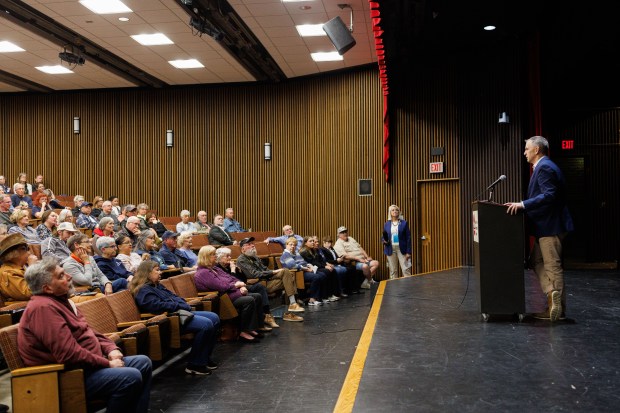CARTERVILLE, Ill. — Southwest suburban Democratic U.S. Rep. Sean Casten acknowledged he wasn’t sure what to expect when he accepted an invitation by the state’s Democratic county chairs to host a town hall Sunday in the ruby red southern Illinois home of the state’s most Republican congressional district.
In addition to speaking more than 300 miles from his Downers Grove home, the four-term lawmaker’s trip to six-term Republican Rep. Mike Bost’s 12th Congressional District also meant traversing the sharp cultural divide between a growing upstate Democratic suburban base and the rural religious fundamentalist conservatism that predominates within the 34-county district that makes up the southern third of Illinois.
Casten’s trip, along with a visit a day earlier to Dixon, the boyhood home of the late President Ronald Reagan in the 16th Congressional District of GOP Rep. Darin LaHood, is in line with national Democratic efforts to host “town halls” in Republican districts. Democrats are using them as a rallying point over the chaotic early months of Donald Trump’s second presidency.
It’s also poking at the advice that the head of the GOP’s congressional campaign committee, North Carolina Rep. Richard Hudson, gave to his Republican colleagues that they stop holding in-person town hall meetings because of anti-Trump protesters.
But unlike higher-profile events featuring Sen. Bernie Sanders of Vermont and New York Rep. Alexandria Ocasio-Cortez, Casten’s southern Illinois appearance was in rock-solid GOP territory, where Trump won 71% of the vote in November and where 70.5% of the district’s voters backed Trump in 2020.
“When I see my Republican colleagues on the other side of the aisle ducking all of these events and saying one thing out of one side of their mouth and then voting the other way and then not having the courage to stand up, I sort of feel like, if you love democracy and if you stand up, your job is to make sure the voters are informed,” Casten said.
“I’m not going to run against Mike Bost,” he said of the GOP congressman who won 74% of the vote in November as the Trump-endorsed candidate. “But I would like to believe that when people vote down there, when they engage, they are informed.”
But on Sunday, where Casten played host at a town hall before more than 120 people at John A. Logan College in Carterville, halfway between Marion and Carbondale, it was a question from a revered local Democrat — not a Republican — that brought to the fore the party’s current internal strife.
“I represent 34 counties in this state, which is one-third of the entire state geographically,” said Glenn Poshard, who represents the 12th Congressional District on the Democratic Party’s state central committee. Poshard, a former Southern Illinois University president, was a congressman for a decade before making an unsuccessful bid for Illinois governor in 1998.
“I’ll tell you what I hear going around that district, which is predominantly rural. ‘OK,’ they tell me, ‘What are you guys talking about? All we’re hearing is cultural issues coming out of the Democratic Party,” Poshard said, citing the lack of child care, health care and grocery stores in rural areas.
“Why isn’t the Democratic Party talking about those issues again, which we used to address? But now we’ve become so urban-centric that the Democratic Party has forgotten rural America?” he asked. “Now, I’m just telling you what these folks are telling me. I know we haven’t. But they know that Mike Bost is not going to speak to those issues. And, if we don’t speak to them, who’s going to solve these problems?”
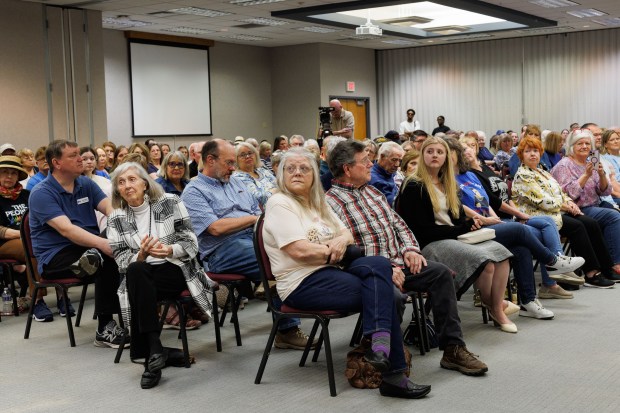
“I don’t know that I have a good answer, and maybe this is a longer conversation for you and I to have over a drink or two at some point,” Casten responded.
“If we are to be the United States of America, we have to be committed to the idea that we’re all Americans,” he continued. “I think all of us have to try to find a way to do that, especially in this Trump era when we’re all tempted to say, ‘I’m going to judge you based on the yard sign you had two months ago.’”
The exchange between Poshard and Casten highlighted the decades-long cultural and ideological shift in southern Illinois, largely due to a loss of union coal mining and manufacturing jobs. During his time in Congress and as a leading Illinois Democrat, Poshard was a pro-union fiscal moderate and social conservative who opposed abortion, gay rights and gun control.
As Poshard bemoaned a lack of attention from Democratic presidential contenders to the region compared with Trump making several appearances here in his three White House runs, Casten sought to point to the political illogic of a candidate on a limited time schedule going to an area where there were few votes to be won.
Later, Casten said Republicans had used culture war issues, such as transgender rights, to provoke rural voters and that in areas where Democrats are outnumbered, such as the 12th Congressional District, the megaphone to focus on kitchen table issues had shrunk.
Unspoken was the fact that it was Democrats in Springfield, in their zeal to maximize representation in Washington, who drew the 12th Congressional District to be overtly Republican. Illinois’ 17-member House delegation is made up of 14 Democrats and three Republicans.
In his 90-minute session, Casten fielded more than a dozen questions from audience members. Most were focused on presidential executive orders and the Trump administration’s withholding of federal funding as well as the potential for cuts in Medicaid and veterans care in the recent House GOP-passed budget.
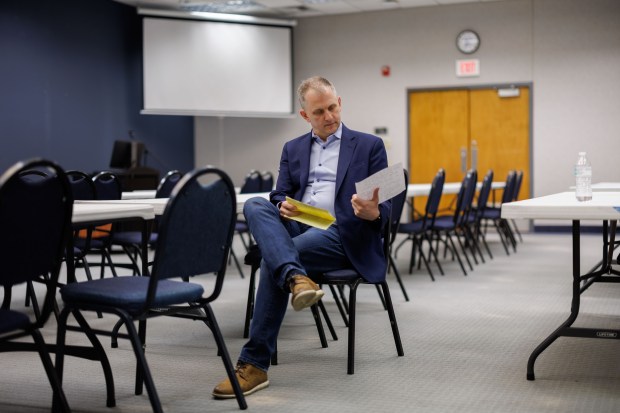
“I can’t sugarcoat this. We are deep in a constitutional crisis,” Casten said of White House moves involving federal dollars that were not authorized by Congress and the refusal of the GOP-controlled legislative branch to hold the executive branch accountable. “The rule of law doesn’t actually get enforced if you don’t have virtuous people in those jobs because the person who’s enforcing the law, if they decide not to enforce it, there is no check that exists in that system.”
Two women in the crowd sporting red Trump caps appeared to be outnumbered by audience members who took a more favorable stance toward Casten and the Democrats.
One of the Trump backers, Laura Reece, spoke generally positively about Casten’s appearance despite having a different political worldview.
“It took guts to come down here. And I thought he did a really good job,” said Reece, whose Trump cap is signed by Darren Bailey, a far-right former state senator who ran unsuccessfully for governor and Congress. “I didn’t totally agree with him. But I think he did a good job on explaining things.”
Reece, who said she’s a bus driver from the Carterville area, told Casten during the event that she sees “what kids are being taught, what they are not being taught,” how kids are dropping out of the public school system to be homeschooled and that “school choice is an excellent idea.” She asked Casten’s view on the issue and he replied how it’s difficult for him to support school choice if there’s an expectation by its backers that they don’t need to pay taxes to fund public education.
Asked about Casten’s response to her question afterward, Reece said, “We just got to do something to get these schools to wake up and realize our kids need a better education.”
Reece said she didn’t care about showing up to the event sporting Trump swag.
“I’m a stubborn person. It didn’t bother me a bit. I thought it was kinda funny, all the stares I was getting,” Reece said. “When I walked in, people were giving me dirty looks. I’m a Southern woman. I can take it.”
But her friend Sandra, who was also at the event, disagreed with how they felt when they arrived.
“We were scared. We were frightened,” she said, declining to disclose her last name for privacy reasons. “It did turn out well.”
While she gave Casten credit for appearing, Sandra said that with Illinois so blue, Republicans don’t have much power and it seems as if they’re not “allowed to have representation in the Illinois state legislature.”
“We’re not his constituents,” Sandra said of Casten. “I don’t know why (Democratic Gov. JB) Pritzker couldn’t come. He probably would’ve gotten a lot more interesting questions that pertain to this area.”
To be sure, even in the heavily Republican region, Casten’s event was held in “the islands of blue in this sea of red that’s generally here,” said John Jackson, a veteran political studies expert and visiting professor at the Paul Simon Policy Institute at nearby Southern Illinois University at Carbondale.
Western Williamson County, where Casten appeared, shares some of the political ideology of neighboring Jackson County, the home of SIUC, where President Joe Biden defeated Trump 49% to 48% in 2020 and Trump lost to Vice President Kamala Harris 50.5% to 47% last year.
Jackson said that for Democratic voters who have seen listless party leadership since the November election, the Casten event and similar efforts are showing them that Democratic leaders are “doing something” to “show the flag and rally the faithful — and right now, the faithful are about all the Democrats have.”
But will such efforts reach anyone outside the Democratic faithful?
“That’s the question on which the ’26 midterms hang,” Jackson said. “Right now, the rational voter, it seems to me, would look at the possibility they made some mistakes in choosing a guy that upset the world’s economic order and military order that had lasted 80 years, just to advance his image of being the master negotiator and the art of the deal.”
“It’s not going to get rid of Mike Bost. Nothing will do that until he decides to retire,” Jackson said. “But Democrats have got to start working on those independents and maybe old-time Republicans around here who weren’t really MAGA types.”
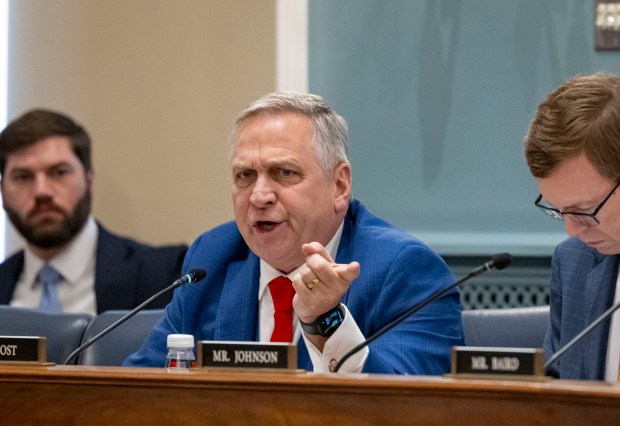
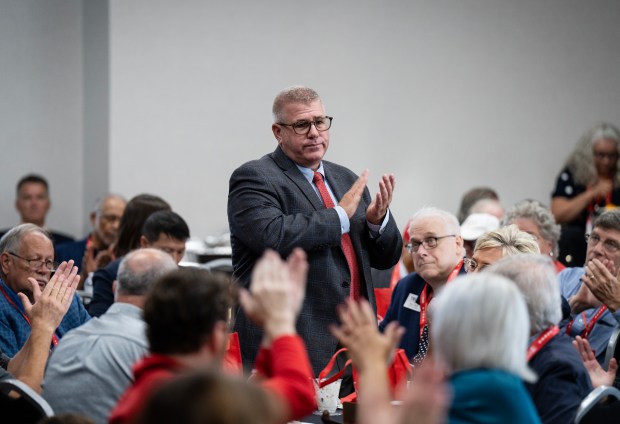
Bost held a small constituent meeting in the northwestern part of his district on March 22 regarding the need for oversight of solar panel installations on farmland. But it was interrupted by at least one protester.
“You’re yellow,” the protester told Bost. “This Marine ain’t yellow, buddy,” Bost, a military veteran, responded before the protester was removed.
“That same thing is happening all over the United States, and it’s very well organized by the way,” Bost said of town hall protests on KMOV-TV in St. Louis. “When I talk to my constituents, I want to do it in a way that’s civil. We actually kept this one pretty civil.”
Bost narrowly defeated Bailey in last year’s Republican congressional primary in a contest of which candidate was a bigger Trump acolyte.
Bost’s political team belittled Casten’s visit.
“What could the Trump-hating, Ivy League-educated Chicagoland liberals possibly learn about southern Illinois’ values from a one-hour media stunt?” asked Bost campaign manager Myles Nelson in a statement.
“The vast majority of us are anti-woke, anti-big government, pro-family and pro-Second Amendment,” Nelson said. “Congressman Bost’s record is much more aligned with his constituents than the outsiders parachuting in to score points with the press.”


